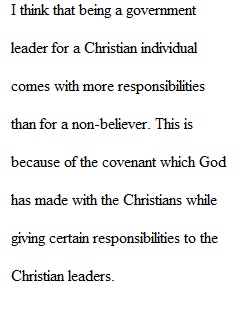


Q Read and carefully consider Romans 13:1-7; Matthew 22:15-21; Acts 5:29; and 1 Timothy 2:1-4. In the first paragraph, describe what the passages say about God in relation to government and government leaders. Consider what this means for any Christian who serves in government, and how government leadership differs from citizenship. Also consider Pharaoh, Joseph, Moses, and David as leaders. Consider that God has created order to society by creating offices (government leaders, family roles, business job descriptions). God’s design was for people to fill these offices. These officials filling an office might do things well or might do them poorly. If they fill the office well, it reflects positively on God. If they do poorly, it reflects poorly on the individual but doesn’t mean the office is invalid. In the second paragraph, describe the difference between the authority that resides in an office established by God, and the official who fills that role. To illustrate, consider this: how does a poor official (bad leader like Hitler or Saddam Hussein) reflect on the office? Besides king or president, what other offices are there (hint: think of any official “role” in society, which might include husband or wife, parent or child, employer or employee, police officer)? Why is it important to be able to separate the office and the officer who fills that office? Why are the offices important for society? What offices do you fill? St. Augustine, in the fifth century, argued that Christians could wage war if the government used appropriate principles to decide whether or not to go to war. These principles, known as the Just War Theory, suggest that in order for agovernment to go to war: (1) it must have a just cause to do so (human rights, defense, etc.); (2) it should declare war as a last resort, only after all other means have been exhausted to attempt a peaceful resolution to the conflict; (3) it should be appropriate (selective action, not indiscriminately killing women, children, the elderly, etc.); (4) it should be proportionate to the issue (e.g., don’t destroy a city to retaliate for a word of insult); (5) it should be measured (able to be engaged in steps); and (6) it should be engaged in only when there is a reasonable chance of a positive outcome. Others have added that it should not be driven by greed or selfish gain. In the third paragraph, describe how this theory relates to Church and State issues based on what you’ve read. You might consider a specific situation in world events as a focal point. Who gives authority, and how does behavior relate to the office?
View Related Questions